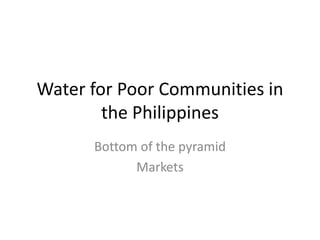Water for poor communities in the philippines
- 1. Water for Poor Communities in the Philippines Bottom of the pyramid Markets
- 2. Background ŌĆó In mid 1990s,urban population was growing. ŌĆó Water services few hours ŌĆó Contaminated water ŌĆó Prior to privatization of MWSS(Metropolitan water works and sewerage System) water supply services in Metro Manilla was inadequate. ŌĆó Water availability averaged 17hours per day and quality below national standards.
- 3. ŌĆó Urban poor residents, majority settle illegally on public and private lands excluded from basic services. ŌĆó They where not connected to MWSS ŌĆó Got water from public faucets, buy it from vendors or illegally from MWSS mainlines or private wells
- 4. Privatization of MWSS ŌĆó Manilla water company Inc took over the operations of east zone in 1997. ŌĆó A Concession Agreement with MWSS of 25 year. ŌĆó Aim to resolve water crises in metro manila within a year ŌĆó In terms of service obligations, MWCI(Manilla Water Company Inc) which won bid for east zone, was required to expand coverage of water supply, sewerage and sanitation services and 24 hour water supply
- 5. ŌĆó MWCI was obligated to cover depressed areas. ŌĆó Massive pipe replacement ŌĆó Serve areas which were previously not served ŌĆó 7 division of areas and each supervised by Area Bussiness Manager ŌĆó Currently 95 demant montoring zones and 263 district metering areas
- 6. Development ŌĆó Major portion of market consist of urban poor residents who buy water from informal vendors and 10times its price ŌĆó Tapping the market and providing water at reasonable cost ŌĆó Supply services to as many as depressed communities ŌĆó Companys ŌĆ£We CareŌĆØ policy
- 7. Partnerships, Roles and Responsibilities ŌĆó Partnerships for assistance and cooperation of local governments units(LGU) and Community-based Organizations(CBO) ŌĆó MWCI responsible for supervision of the construction and laying of new pipelines to connect the area, installation of bulk meter, and sub meter or individual meters ŌĆó A regulatory office(MWSS-RO) was established by Concession agreement







